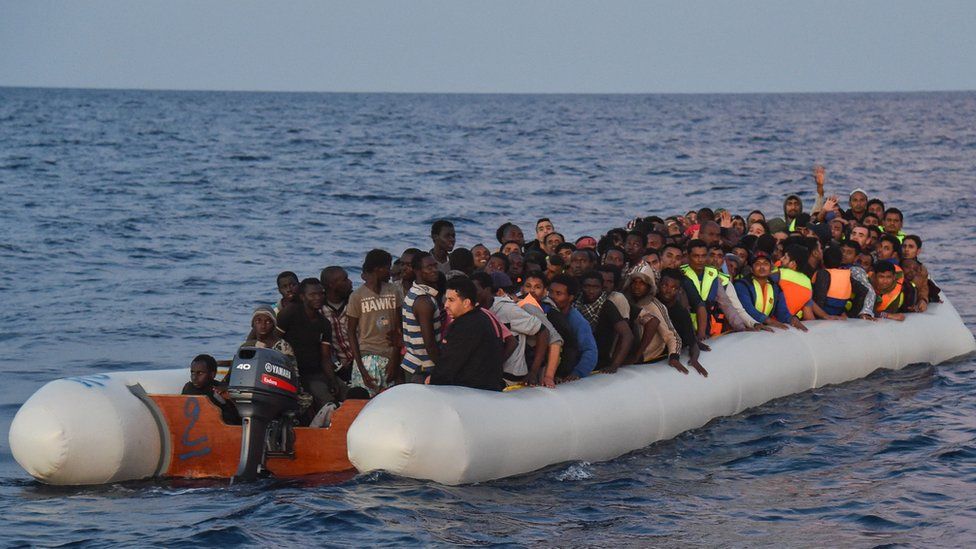Migrant crisis: EU to curb rubber boat sales to Libya
- Published

EU foreign ministers have agreed to restrict exports of inflatable boats and outboard motors to Libya in a drive to curb the smuggling of migrants.
The restrictions will not apply to legitimate Libyan businesses, such as fishing crews, an EU statement said.
It is not clear how the EU will check that such exports do not end up in the wrong hands in the lawless country.
Meanwhile Luxembourg has warned that EU funds may be helping to drive migrants into Libyan "concentration camps".
Many migrants exploited by people-smuggling gangs in Libya have suffered brutality, including sexual abuse. The country is plagued by violence and lawlessness.
More than 88,000 migrants have crossed the Mediterranean to Italy so far this year, and more than a quarter of them arrived in June alone.
The numbers are higher than in the first half of last year.
Responding to an Italian plea for help, the EU has been helping to train Libyan coastguards.
Luxembourg's Foreign Minister Jean Asselborn said "we have financed these coastguards and it's right," but that migrants were being brought back to Libya "to these camps we've seen pictures of".
"Those are sometimes concentration camps, camps where people are raped, where there is no law."
Italy has EU backing for a code of conduct that would regulate non-governmental organisations (NGOs) involved in rescuing migrants off the Libyan coast. Critics accuse NGOs of encouraging departures of migrants from Libya.
EU foreign policy chief Federica Mogherini said 5,000 migrants had returned home voluntarily from Libya this year under EU-funded schemes, more than double the number in the whole of last year.
The EU export restrictions will apply when there are "reasonable grounds" to suspect that people smugglers are the end users. Boats and motors in transit to Libya via the EU will also be restricted.
Italy delays citizenship law
Separately on Monday, Italian Prime Minister Paolo Gentiloni said conditions were not right to push through a bill giving citizenship to the children of immigrants.
The law would make some 800,000 people citizens and has already taken years to reach the upper house, or Senate.
Right-wing parties hailed the prime minister's delay but migrant groups said they were bitterly disappointed.
Earlier this month, the BBC spoke to a mother who fled Libya with her child
Mr Gentiloni called the bill on citizenship "just", but said he had run out of time and was putting it back until autumn.
Many of the new arrivals have come through Sicily, and when a local prefect on the island sent 50 migrants to a hotel in the village of Sinagra at the weekend, dozens of local mayors began a protest outside.
They argued that the facilities were insufficient and the number was far higher than the government's agreement with local authorities to aim for 2.5 migrants per 1,000 of population. "We aren't racist, or against migrants but the distribution has to to be fair," said local mayor Vincenzo Lionetto Civa.
Migrant issue a hazard for Italian government
By Julian Miglierini, BBC News, Rome
For the normally meek Paolo Gentiloni, the U-turn on this bill that would have extended citizenship rights to the children of long-term immigrants has been quite dramatic - but not entirely surprising.
It had become obvious that a Senate debate would have sparked an internal conflict within his coalition.
It has also revealed how, in Italy's current political climate, anything related to the issue of migration can become politically toxic.
With migrant arrivals solidly above last year's numbers, the right-wing Northern League and populist Five Star Movement have stepped up anti-immigrant rhetoric.
What is Italy proposing?
Many European countries already grant citizenship to the children of migrants born on their territory, although the terms vary considerably.
Italy's centre-left-led coalition is planning to offer citizenship to children either born in Italy or those who arrive before they are 12 and spend five years in formal education.
Men believed to be migrant smugglers are spotted during a rescue effort in the Mediterranean
The controversial "ius soli" (right of soil) has taken years to reach Italy's upper house of parliament and when it arrived in the Senate it became the focus of thousands of amendments aimed at halting its path.
It is currently difficult for immigrants to obtain Italian citizenship without an Italian parent.
However, the number of people becoming Italian citizens has risen - 201,501 acquired Italian citizenship in 2016 alone.
Right-wing Northern League leader Matteo Salvini said more than 7,000 migrants had arrived in southern Italy this weekend alone, adding that the Sicilian mayors' protest was proof that people had had enough.
A note on terminology: The BBC uses the term migrant to refer to all people on the move who have yet to complete the legal process of claiming asylum. This group includes people fleeing war-torn countries such as Syria, who are likely to be granted refugee status, as well as people who are seeking jobs and better lives, who governments are likely to rule are economic migrants.
- Published8 July 2017
- Published6 July 2017
- Published6 July 2017